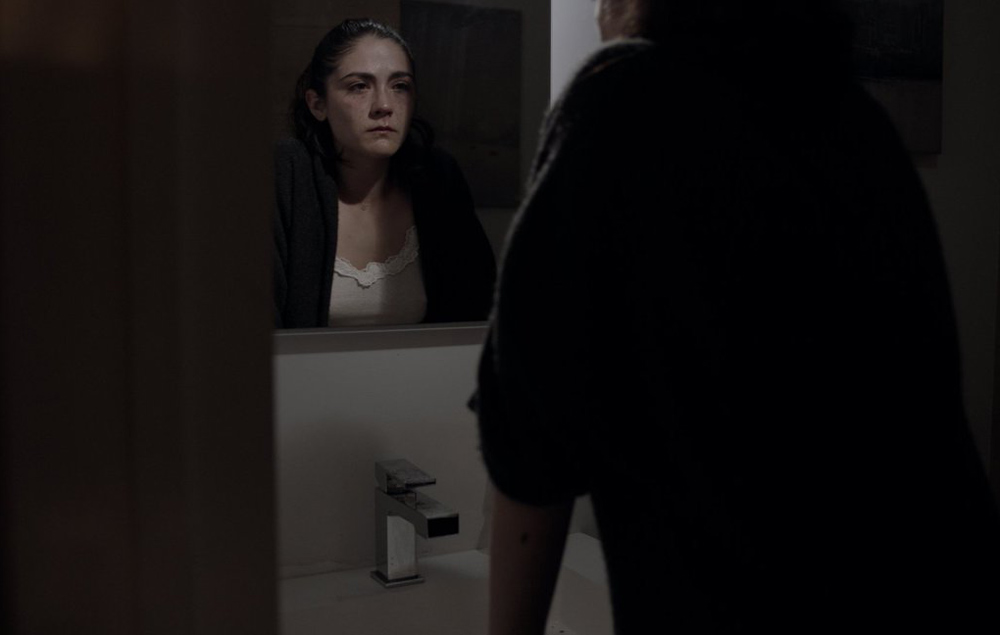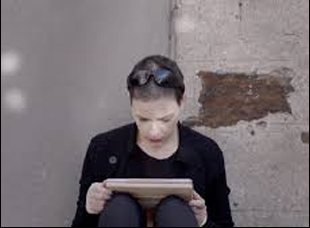“It’s a fucked up business,” says Pearl (Isabelle Fuhrman), standing outside a casting call in “Tape,” after seeing Rosa (Annarosa Mudd) hasn’t been invited up. “So much luck, so unfair, so many talented people don’t get to work.”
The aspiring actress says this like a grizzled veteran, and of course in her early twenties as a product of NYU, she certainly has experience, but she couldn’t possibly be prepared for what happens in Deborah Kampmeier’s latest film in which it becomes apparent that there’s a lot Rosa knows that Pearl does not yet. Ever since her blistering 2003 feature debut “Virgin,” in which a teenaged Elisabeth Moss was faced with the prospect of carrying a child to term which she was left unaware of how it was conceived – thought to be a miracle when evidence suggests it was a rape, the writer/director has peered into the darkest corners of a society where men hold all the power, circling back to shine a light inside the ugliest fringes of her own profession where predatory producers, agents and managers entice young actresses to take off their clothes and perform sexual acts under the pretense it’ll lead to their big break.
While the scenario that unfolds in “Tape” may seem unbelievable at first as Rosa hatches a plot to ensnare such a creep named Lux St. Seguin (Tarek Bishara) while using Pearl as unwitting bait, following her with hidden cameras after her audition and knowing where it’ll lead since she once was in her shoes, it is made more resonant with the knowledge that it was inspired by the real-life experiences of Mudd, who shared her story with Kampmeier and ultimately gets the satisfaction of confronting her assailant on screen in a way she never could in real life. As has long been the case with Kampmeier, “Tape” is raw and uncompromising as the filmmaker puts an unspeakable act into the contours of a riveting thriller and like her previous film, “SPLit,” she engages with a long history of artistic expression that said what could not be under other means at the time of its making.
As a result of the coronavirus, “Tape” is going exclusively online for an innovative two-week release where nightly screenings beginning tonight, starting at 7 pm EST, will be accompanied by conversations between Kampmeier and other filmmakers, and in the midst of reworking the her release plan to get the film out to the widest audience possible, Kampmeier graciously took the time to speak about how it took shape, developing a distinctive cinematic language to tell this story and how events in the outside world related to the #MeToo and #TimesUp movements changed her ideas. (Note: There are some spoilers ahead, but after watching the film, you can click to unblur.)
My very dear friend [Annarosa] came to me and was working with me on some writing I tried to get into development, and she had writer’s block. I’m also a teacher, so the teacher in me rose to the occasion and was really trying to push her through this block and in the process, I asked her to do a timed writing. I can’t remember now the prompt I gave her, but when she read this piece of writing back to me, she said, “I am afraid that if I move into the public eye, a tape is going to surface.” And I was immediately like, “Tell me more.” She proceeded to pour this entire story out that she hadn’t shared with anyone except for one friend at the time it occurred six years before. Of course, I was extremely moved because I also started off as an actor and it resonated a lot with what I experienced, so I said to her, “Please consider going to therapy about this and after you’ve done let me know if I can make this into a movie?” And that’s what happened. She went into therapy and three months later, she came back and said I could make the film.
After [Annarosa] had given me the whole story, I said to her, what would you like to have happen to this guy and she said in this very fierce tone, “I want him publicly humiliated and I want to watch him suffer.” The fury in her expression inspired the character of Rosa, and this revenge fantasy arc of hers that she could then play, so she was attached [as an actress] from the start. I also had Isabelle Fuhrmann in mind from the moment I wrote the script. I had worked with Isabelle before — “Hounddog” was her first film. In Annarosa’s experience, her perpetrator had a “type.” All the women looked alike, so Stephanie Holbrook, my casting director brought me all these actresses that had a similar look to audition for me.
This brought to mind something I had never considered specifically in relation to your films, but you generally work with young actresses and when they’re used to working in a male-dominated industry, is there a certain degree of deprogramming that you have to do when collaborating on a performance?
The process of preparing and shooting this film was absolutely informed by me being a female director. It’s very important to me to create a safe space, which I’ve tried to do on all my films. I had all female department heads on “Tape,” as well as [my last film] “SPLlit.” I have an eye contact exercise I always do in two-person scenes where I essentially have the two actors sit across from each other — no acting, just making eye contact for quite a long time. At a certain point, I have them add their lines in, but again, it’s not about acting. It’s about them connecting to each other.
I also decided in rehearsal to have Annarosa speak Pearl’s lines and I had Isabelle speak Rosa’s lines. I had Tarek sit across from Annarosa while Annarosa spoke Pearl’s lines, which were actually Annarosa’s words, because everything that happened to Pearl, step by step and word by word was Annarosa’s experience. This was the most generous moment maybe I’ve ever seen [when] Annarosa sat there, speaking these words and making eye contact with her whole soul pouring out – I could feel Isabelle absorbing it all, so I just felt when she was performing, she had taken all of that in from Annarosa and was now releasing it all back out. It was extraordinary osmosis that occurred between them. It was the same for Tarek [Bishara], who had such deep compassion and empathy, which was important to me. It was essential to me to have an actor that was a good guy [in real life] — and he’s a really good guy — playing that role [of the perpetrator] and holding the space for what everyone was going through, so it was very much a safe space I was creating from the beginning to the end.
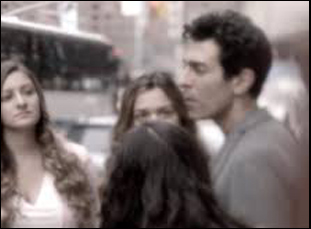
I started off in the theater, so it’s a very important piece of me as an artist and personally, I feel the theater saved my life. I was very self-destructive in my early years because of my own history of abuse, and the theater was a place to express all of my pain and rage in a way where I didn’t harm myself and the place I found to heal, so I brought that into “Split” for that reason. I brought Lavinia into this script initially because after [Annarosa] had given me permission to write the script, she said to me, “Could you also put a little nod to Lavinia from ‘Titus Andronicus’ in there?” And she was expecting just some little [nod], like the postcards of Lavinia [that you see in the opening credits] and having it stop there.
But as I was working on it, this became the central metaphor for the whole film. For people that don’t know the play “Titus Andronicus,” Lavinia is brutally raped and her tongue’s cut off so she can’t speak and her hands are cut off so she can’t write about her rape. I feel that is such a metaphor for so many women who have been sexually violated and can’t speak about what happened. The silencing of women can be as harmful and destructive as the violence itself, another layer of trauma that we endure, so for me, Lavinia was important on so many levels.
Do you think the process of dramatizing this was therapeutic for Annarosa?
Absolutely. I felt so passionate about sharing her story that I wrote the script in five days, and when I sent it to her, she told me she was in a park in Brooklyn and she sat down on a bench and she read it twice. That may have been the most fulfilling moment in the process when she called me and she was in tears, which was so moving to me because when she originally told me this story, she hadn’t wept, but there was this enormous release and relief in reading her story, which I feel is what art is about. It’s where we can experience ourselves. She said to me that she felt electrified, like the screenplay was changing her on a chemical level and she could suddenly move differently through the world, that she was once a blur and now she could show up boldly and clearly and she could see herself that way. That, for me, is everything.
That seems like a good way to describe the camera style of this in terms of how you use focus.
Yeah, I had this idea that I wanted three cameras — one for the producer that was representing the male gaze, that was very slick and almost pornographic in its objectification, then I wanted the hidden camera [that Rosa wears or sets up] to search for the female experience, her own experience. We did use some actual hidden cameras, but mostly we used a tilt-shift lens on our Alexa. The third camera is my storyteller camera. I’m really interested in trying to find a cinematic language that shifts from the male gaze to the female experience. I speak of the female experience rather than the female gaze because I don’t go through the world gazing. I go through the world experiencing and I experience in my body and I experience in my emotions.
I want to keep trying to pull focus from the male gaze to the female experience, so in the film, I’m trying to express on this visceral level how the search for it is hard and there’s difficulty in finding focus and knowing and capturing the female experience, but I also know that the payoff at the end of the film is worth the uncertainty of that search. [spoilers blurred] In that moment when Isabelle’s character Pearl looks at the clock, which is a hidden camera, we’ve just heard a highly performed, almost pornographic sound of sex and we expect the image we see to be that male gaze on the female body part and instead, we see her face looking straight at the camera and we get that female experience. To me, that’s the payoff of the whole thing.
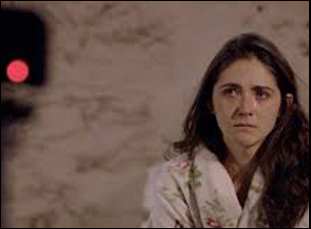
It was very technical, including the tongue piercing moment and the wrist cutting, but she obviously did [really] shave her head and what’s funny is that we got halfway through [that scene] when we lost the light, so I made her go home with a hat on her head. She was like, “I’m not looking in the mirror” and came back the next day, took her hat off and we started shaving her hair off [again], but that moment is so important in terms of this ritualistic act of identifying with Lavinia and calling upon the history of all of the women who have suffered and giving herself courage to go after this man on this journey that she’s about to go on. Of course, she shave her head to disguise herself but it was also this warrior pose she took on, and going back to that earlier question you asked, part of the importance of bringing Lavinia in was to bring the history in because this is not a new thing. The #MeToo and #TimesUp movements are bringing this to light, but this has been going on since the beginning of patriarchy. Shakespeare was writing about it, so I wanted to bring Lavinia in to honor the epic, endless nature of rape culture.
I understand the development process of this was interesting in that you wrote this before the reckoning of the #MeToo movement, but it didn’t ultimately get produced until after. Did your ideas about this change from conception to being on set?
It’s very interesting [because] I had written the whole script prior to the Harvey Weinstein news breaking and we were in preproduction for a week when our financing fell through. Two years later when we found our new investor, he said that he had been seeing all these stories of women coming out about Harvey and he just couldn’t understand how it happened, but when he read our script, he understood and he felt like other people want to understand, so that was his reason for financing the film. And the script [as originally conceived had a different ending].
[spoilers blurred] It had [Rosa] shooting [Lux] and had the women in the restaurant wiping down the gun and putting it in his hands so it looked like a suicide before the cops arrived. I realized the reason that she did that pre #MeToo is because nothing was changing, but post-#MeToo, I realized things are changing, so she’s not going to kill him, and as women, it’s not about killing him. It’s about going from isolation to connection. That’s what happened in the #metoo movement and that’s what happens at the end of the film, so that little change was made in response to being post #MeToo. It just felt like things are changing. As we’re coming together as women and sharing our stories and women are being believed, I think all of this is beginning to shift.
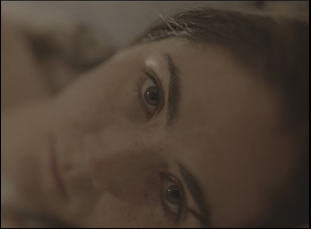
Of course it was so challenging, and my challenge is minor in the context of what a lot of other people are having to deal with at this moment in time. Initially, we were going to do [both] online and a theatrical and we would be live streaming from the theater so that the conversations afterwards could be had. I’ve experienced after each of our test screenings and then our festival premiere at Female Eye a few weeks ago that the moment the film’s over, women begin to share their stories and men as well and I wanted the theater to be a space where we could do that. And it was a disappointment not to be able to, but I do feel like we have an opportunity to create an even bigger community through this online release that’s including 14 days of conversations post-screening. I think actually we have something very special we’re able to do right now. I feel so grateful that we can expand the conversation and more people can be included.
“Tape” will have its virtual premiere on March 26th with an online screening starting 7 pm and a post-screening conversation beginning at 8:45 pm. These screenings with conversations will continue through April 8th with access available here. The film will be available on traditional VOD, starting April 10th.




